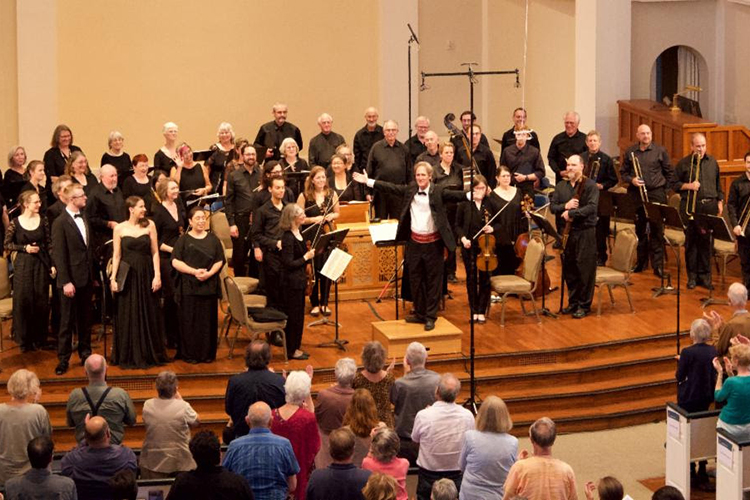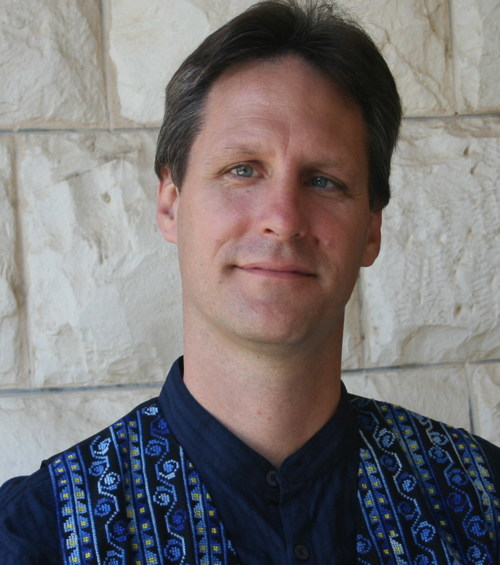Meet Paul Flight, UC Choral Ensembles’ new director
The noted choral conductor, teacher and singer will oversee eight music groups at UC Berkeley starting July 3
June 26, 2023

Paul Flight finishes conducting a performance by the California Bach Society at the First Congregational Church of Berkeley in 2019. Flight will become director of the UC Choral Ensembles on July 3. (Photo by John Gale)
Noted choral conductor, teacher and singer Paul Flight will become the new director of the UC Choral Ensembles. In his position, which will begin July 3, Flight will oversee eight music groups at UC Berkeley: Cal Chorale, Cal Jazz Choir, California Golden Overtones, Men’s Octet, Noteworthy, Perfect Fifth, BareStage Productions and UC Alumni Chorus, which involve 200 students each academic year.
Flight is the founding director of Chora Nova, an auditioned chorus based in the city of Berkeley, and artistic director of the music ensemble Schola Cantorum San Francisco. Over the past 17 seasons, he has served as artistic director of the chamber choir California Bach Society, and for nine years, he was principal conductor of the Madison Early Music Festival. He has also been a visiting professor of music at Berkeley, where he directed the music department’s top choral ensembles.
In this Q&A with Berkeley News, Flight talks about when he feels most free, why he doesn’t get nervous anymore and what’s behind his teaching philosophy.

As director of the UC Choral Ensembles, Flight will oversee eight music groups at UC Berkeley.
Berkeley News: What is one of your first memories of or encounters with music?
Paul Flight: My parent’s record collection, especially Meet the Beatles!
When you’re teaching music, what is your main guiding philosophy?
To provide a meaningful experience to the student and to impart the knowledge in an inspiring way. I make sure to rehearse in a way that is encouraging, but rigorous, as well, and I always strive to convey the love I have for the music to the students.
What song have you been listening to recently?
Brahms Waltz in A for piano four hands. It is beautiful and gives me great pleasure. I’ve recently enjoyed a fine performance on YouTube by the Shin/Park Piano Duo.
Have you ever felt like you totally failed during a music performance?
Yes, a dress rehearsal in Cincinnati. It was in the middle movement of Leonard Bernstein’s Chichester Psalms. I was the vocal soloist with a large symphony orchestra, and I had vocal trouble. Essentially, I was in the final rehearsal with the orchestra, and nothing came out when I went for the high note from a note down lower, a leap of a seventh. I was embarrassed! After an hour or so of work on the spot, I got the hang of it and sang well in the performance.
When do you get the most nervous?
I used to get quite nervous when performing, but no longer — too many years of performing. I suppose if I were suddenly called upon to conduct the San Francisco Symphony in a difficult work I would be understandably nervous. That first impression you give to a great orchestra is important — you want them to respect you.
When do you feel the most free?
When listening to music I love deeply — the Rachmaninov 2nd Symphony, the second movement of the F minor Piano Quintet by Johannes Brahms, the Mozart Requiem, William Byrd Mass for Four Voices, Linda Ronstadt singing anything with the Nelson Riddle Orchestra, to name a few. And I feel free when walking in nature, away from people.
When do you feel especially accomplished?
When I finish conducting a particularly challenging piece, such as my recent performance of a large work by Gustav Holst, The Cloud Messenger. I once was called upon to sight-read a difficult concert with no rehearsal beforehand and managed it really well — that was a good feeling. It takes time and training to develop the skill of sight-reading. It is a bit like becoming fluent in a language, such as German or Spanish. One must ultimately become conversant, and that is done by conversing on a daily basis.
How do you feel when you’re singing? Conducting? Performing?
These days, the emotional enjoyment of the music takes second place to doing the task at hand. I find myself concentrating on what I’m doing more than simply enjoying the feeling of performing. In other words, I’m focusing more on getting the job done.
What do you love about conducting? How is it different from performing?
I love conducting, and I enjoy helping a chorus get a lovely sound. I don’t feel as much pressure when I’m leading musicians at the podium, although I know that it is a big responsibility! I change how I conduct a piece depending upon the articulation I want, or the dramatic intensity or the musical phrasing.
How do you envision success for UC Choral Ensembles? How do you define your mission or purpose?
I want to create a supportive environment for students and alumni to make music. I’d like to impart my special expertise in singing and choral direction to the ensembles. I want to hear the students enjoying their music making all over the campus — in the concert halls, perhaps in some of the Berkeley churches adjacent to the campus and also outdoors around the campus in places where the various a cappella groups perform for passing students, such as outside the Sather Gate.
What’s the most important or meaningful thing that you’ve learned from teaching students?
To listen to their feedback and to adjust my teaching approach, as necessary. When rehearsing with students, I have learned over the years to get great results without being stern. While some students have appreciated a harsher, more drill sergeant-like demeanor, most do not, and have said so.